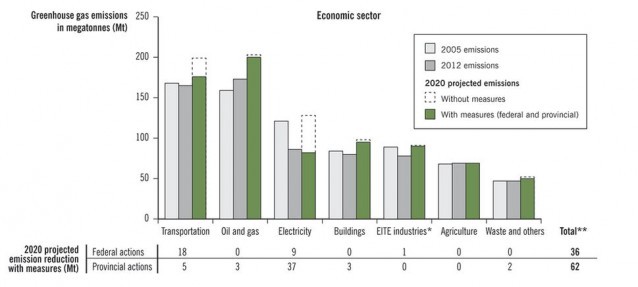Canada’s federal government isn’t doing enough to meet its 2020 target for greenhouse gas emissions reductions, according to a new report from the country’s environmental watchdog.
In 2009, as part of the Copenhagen Accord, Canada pledged to reduce its emissions 17 percent by 2020, compared to 2005 levels. The report, which was put together by Canada’s Commissioner of the Environment and Sustainable Development, found that in six years, if a new sense of urgency isn’t adopted by the government, Canada’s greenhouse gas emissions output will remain virtually unchanged at to 734 megatons, compared to 2005 levels of 737 megatons.
Regulations that could have decreased Canada’s greenhouse gas output have been “delayed” and “good practices have not been consistently followed.” The report notes that while some progress has been made since the Environment Commissioner last published the audit in 2012, the federal government still has a long way to go if it wants to meet its emissions reductions target.
“In 2012, we concluded that the federal regulatory approach was unlikely to lead to emission reductions sufficient to meet the 2020 Copenhagen target,” the report states. “Two years later, the evidence is stronger that the growth in emissions will not be reversed in time and that the target will be missed.”

The lack of regulations on Canada’s burgeoning oil and gas industry are contributing heavily to the country’s failure to stay on track emissions-wise. According to Environment Canada data cited in the report, the country’s oil and gas sector is on track to emit 200 megatons of greenhouse gases in 2020, an increase of 27 megatons from 2012 levels. This represents the largest increase in emissions of any sector in Canada, including transportation and electricity.
In spite of this increase, however, the report notes that oil and gas regulations have been “repeatedly delayed” by the federal government. The government finished drafting regulations on the industry over year ago — and promised back in 2006 that regulations for the sector were coming — but so far, no regulations have been implemented.
The report also notes that more work needs to be done to create a lasting plan for monitoring the effects Canada’s tar sands industry has on air, water and the overall environment. As of now, it’s not clear what role Environment Canada, the country’s environmental protection department, will play in the monitoring plan past March 2015, the report states. Accurate monitoring of the environmental impact of tar sands extraction is crucial to Canada’s continued environmental health: data from 2012 show that chemical air pollution from the tar sands has gotten worse over the years, and a February study found that the levels of dangerous polycyclic aromatic hydrocarbons (PAH) released during tar sands mining and processing may be two to three times higher than government estimates.
“Despite some initiatives and progress in certain areas, there remain many unanswered questions,” Commissioner of the Environment Julie Gelfand said in a statement. “In many key areas that we looked at, it is not clear how the government intends to address the significant environmental challenges that future growth and development will likely bring about.”
The commissioner’s report comes about a month after a report found that Canada leads the world in forest degradation, due to oil and gas development, logging and climate change. According to Peter Lee, Director of Global Forest Watch Canada, there’s a “lack of of political interest in conserving virgin forests,” in Canada, despite the fact these forests are the ones most often logged in the country. Climate change is also driving the degradation of forests in Canada by contributing to longer, more intense wildfire seasons.
Canada’s Prime Minister Stephen Harper has long been criticized for scaling back Canada’s environmental commitments. Last year, his administration cut more than $100 million from the country’s Department of Fisheries and Oceans, and the administration has been accused of “muzzling” scientists, preventing them from speaking to the media about a range of environmental topics. The government also withdrew Canada from the Kyoto Protocol in 2011, and Harper didn’t attend the UN’s climate summit in New York City last month.
